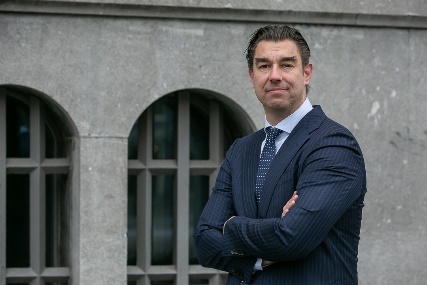
Damiën Berkhout, together with Stefan Tuinenga, started the Amsterdam litigation firm Lindenbaum on February 1. The pair were previously partners at Scott+Scott. Data&Privacyweb spoke with Berkhout about this new step in his career and what he thinks he can add to public affairs with his firm.
For the past four years or so I have set up and managed the Dutch office of an international law firm. That was inspiring work, but it still kept itching to one day build a completely independent litigation firm from the ground up according to my vision and philosophy. I decided to scrimp and Lindenbaum is the result.
I take all experiences with me, as I essentially continue my full practice, but within Lindenbaum, an independent European litigation firm.
There are, I think, two particular and related challenges in the coming time. First, of course, the rise of AI. This technology will dramatically change our lives. Work is going to become much easier, but an awful lot of jobs will also be lost. And what about intellectual property rights, and the use of public data by companies and governments developing AI? What is that going to do to our privacy? The second development is the continuing rollout of "The Internet of Things," IoT in proper Dutch. All those objects that are connected to each other and the Internet and collect data. The IoT will create complex privacy issues, and the data generated by the IoT will in turn drive the further development of AI. It is a task for society and politicians to manage these developments. A clean task, and there is also a role there for lawyers as far as I am concerned.
Our firm specializes in assisting aggrieved parties in complex cases, such as data subjects whose personal data is unlawfully processed, consumers whose money is being swindled out of their pockets, and multinational corporations facing damages from unlawful competition. These are often cases where damages are suffered collectively, and an important part of our practice revolves around so-called class actions, where we stand up for a larger collective. In short, we specialize in private enforcement of the law, where society itself takes action to repair dents in the legal order.
The government cannot do it alone. There are simply too many wrongful acts, and the government has too limited resources. Moreover: when the government takes action through public enforcement, it is almost always purely forward-looking, and compromises are made with the perpetrators to bring the matter to a quick conclusion. The victims are usually left with the pieces. We can serve the public cause by offering injured parties specialized assistance, and the opportunity for private action. In addition, we also focus more specifically on so-called public interest actions, where, for example, environmental or social damage may be involved that affects very large groups.
There are an awful lot of fun things you can do, so I think this is a very difficult question. Who knows where you would have ended up, had you chosen that other path? For a long time I still wanted to study biology, specifically on biotechnology research. So maybe I would have traded the gown and bef for a white coat.
My advice is to take in many different viewpoints, and thus seek sources that advocate all sides of the spectrum. But let me not dodge the question and offer a few suggestions. First, "Skin in the Game" by Nassim Nicholas Taleb. The book is not specifically about data or privacy, but it contains many insights that you can use when you concern yourself with those topics. Second, "The age of surveillance capitalism" by Shoshana Zuboff, a book in which the author argues that a new form of capitalism has emerged through the business models of companies such as Facebook. The idea of so-called "surveillance capitalism" deserves renewed attention with the introduction of Chat GPT, and other AI models that use purported "open information. By the way, if anyone reading this has any great suggestions for me, please send me something via LinkedIn. That's my final tip then: ask other people what you should read. That will help you get out of your bubble.
Interested in learning more about Damiën Berkhout's area of work? Then be sure to come to the Privacy and Mass Claims course, on June 27. Find more information about this afternoon course here.